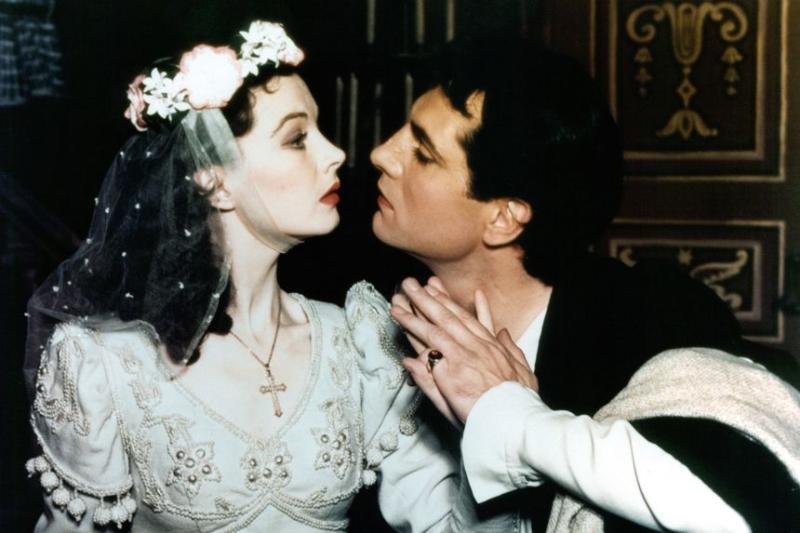'Truly, Madly' Review: Vivien Leigh and Laurence Olivier's Star-Crossed Love
By: Ty Burr (WSJ)



Late in Stephen Galloway's "Truly, Madly," a workmanlike and ultimately sorrowful dual biography of Laurence Olivier and Vivien Leigh, comes an anecdote that could stand as a fractal representation of the couple's relationship, both with each other and with the outside world. The setting is a 1955 performance of Shakespeare's bloody "Titus Andronicus" at Stratford, with Oliver as the titular Roman general and Leigh as his daughter, Lavinia. He is perhaps the most respected and admired actor on the planet; she is a few years out from winning her second best-actress Oscar, for "A Streetcar Named Desire" (1951). She is also a few months out of Netherne Hospital in Surrey, England, where therapy for her bipolar-induced psychosis included electroshock treatments and nearly three weeks in a medically induced coma.
Let Anthony Quayle, who played Aaron the Moor, tell the story: "While Titus was speaking words of love and comfort to poor mutilated Lavinia, [Leigh] would be cursing [Olivier] with the most extreme obscenities imaginable, with a piece of bloody gauze tied over her mouth. The audience could not hear what she was saying or realize that she was speaking at all, but it was perfectly audible to those of us who were there."
“The audience could not hear” is a deft summation of the bubble of adoration in which these two were encased; the Oliviers privately sometimes referred to their public image as “the legend.” An Olympian mating of talent and physical perfection, privilege and commercial popularity, art and intellect: That was Laurence Olivier and Vivien Leigh. Wasn’t it?
“Truly, Madly,” by contrast, is told by those “who were there,” in Quayle’s words. In its final chapters, the book is deeply harrowing, not least because mental illness remained a misunderstood scandal in mid-20th-century Western culture. “The saddest thing is that we didn’t realise that she had an illness,” one friend of Leigh reports. “We all thought she was just behaving badly.”
Mr. Galloway, a former executive editor of the Hollywood Reporter, has absorbed all the available biographies and autobiographies—it helps that nearly every successful actor of the couple’s generation seems to have written one—and “Truly, Madly,” to its benefit and detriment, at times reads as an inspired feat of collation. When we get four different versions of one of Leigh’s more spectacular manic episodes—as recounted by Olivier, David Niven, Stewart Granger and Peter Finch’s wife, Tamara Tchinarova—the result is a fine example of the “Rashomon” effect, in which every teller is the star of the tale. As biography, however, this approach often produces a muddle.
The author also talked to their still-living colleagues, as well as those who watched from the sidelines as children: the actress Hayley Mills; the book editor Michael Korda, a child of the most esteemed British film-producing clan of the period; Tarquin Olivier, the son of Laurence and his first wife, the actress Jill Esmond. Mr. Galloway has dived into the archives and come up with red meat from Marlon Brando’s audiotaped memoirs and the letters of Noël Coward.
Coward, in fact, could serve as this book’s shadow narrator. He was there at the start of Olivier’s career (as author and co-star of the original 1930 London production of “Private Lives”), and in his recollections he snipes, occasionally with empathy, about Leigh’s behavior, which he attributes to alcohol and her husband’s failure to smack her around even a little. At the same time, Coward provides the most concise aperçu of the Olivier-Leigh paradox: “Their life together is really hideous and here they are trapped by public acclaim . . . . They are eminent, successful, envied, and adored, and most wretchedly unhappy.”
It wasn’t always so. Olivier was born in 1907, the son of an itinerant minister and a beloved mother who died of a brain tumor when he was 12; the titled peer of British theater was a self-made artist with a spotty public education. Leigh, born Vivian Hartley in 1913, was the only child of British colonials in India, who stashed her in a convent school outside of London from the time she was 6. Both actors were married to others when they met in 1934: Olivier to Esmond, Leigh to the barrister Herbert Leigh Holman, from whom she took her stage name. Both were parents of very young children. And both were smitten from the start, two young and stunningly good-looking actors whose sexual attraction was overwhelming. Olivier’s mentions of her in his diary quickly slide from “Vivien Leigh” to “Vivien” to “Viv” to “Vivling,” by which time he was confiding to a friend that they were having sex two or three times a day.
There followed what Olivier called “two years of furtive life, lying life,” although everyone in their theatrical circle seemed to know—“I suppose it would have been considered scandalous in any ordinary group,” sniffed one onlooker. In 1938, Olivier sailed to America to appear in Samuel Goldwyn’s film production of “Wuthering Heights,” writing daily letters to Leigh that devolve into swooning word salad: “LOVE REAL LOVE TRUE LOVE BURNING HEARTS BLOOD PASSIONATE ADORATION.” Leigh arrived in Los Angeles a month later, to visit Olivier but also to see whether the role of Scarlett O’Hara might be within her reach. Fearing reporters, her lover met her at the train station crouched in the back of a car.
“Truly, Madly” has passages of overstatement and florid speculation. Of Leigh’s ambition to play Scarlett: “Was it her own ferocious need to win the role, to achieve everything she had dreamed of, to fill the gaping hole that had been hollowed out when she was wrenched from her home?” But when Mr. Galloway writes “Vivien had won the most coveted part of the century, the most desired since the invention of film,” he’s actually on solid ground. “Gone With the Wind” propelled Leigh into the front ranks of superstardom just as “Wuthering Heights” turned Olivier into a matinee idol. Both were nominated for Oscars; she won, and he lost to Robert Donat in “Goodbye, Mr. Chips.” (Olivier said of Leigh’s Oscar, “it was all I could do to restrain myself from hitting her with it. I was insane with jealousy.”) Their divorces granted at last, they drove to Santa Barbara, Calif., to get married in August 1940. Katharine Hepburn and Garson Kanin were the witnesses, the justice of the peace was drunk, and the happy couple fought all the way there and back.
Why was Leigh unable to sustain a movie career after Scarlett? The war and the couple’s war efforts for Britain took prominence. Olivier was on the ascendant with his brilliant filming of “Henry V” and his leadership of the Old Vic in 1944. The British stage elite saw her as a lesser talent, and the manic depression that had roots as far back as Leigh’s adolescence had begun to manifest itself in crippling lows, frightening highs and periodic breaks from reality.
In these passages “Truly, Madly” comes alive as a book, and it is a gripping and terribly sad reading experience. Acknowledging that “giant leaps in understanding mental illness” have been made in the intervening decades, Mr. Galloway avails himself of psychiatric experts from Oxford, Johns Hopkins and elsewhere. Their insights, while not terribly surprising to a modern reader, make clear how poorly this miserable, intelligent woman was served by all around her and how weary she could be when lucidity returned. “Oh, Colin, it’s so nice when it’s over,” she sighed to an acquaintance after one episode.
Anyone who judges Leigh a subpar actress need only look at her Blanche DuBois in “A Streetcar Named Desire,” a performance as intuitive and battle-scarred as any in the movies. The actress claimed that the film “tipped me into madness.” In any case, the years that followed are striking for their alternations of profound illness and a tireless work ethic. During a 1961 tour of Australia, she was, in the words of Patrick Stewart (yes, that Patrick Stewart), “doing eight shows a week for fifteen months, playing leading roles, and she never missed an entrance or a performance.”
If only by contrast, Olivier takes a bit of a beating in “Truly, Madly.” He comes across as a glittering hero of the stage who could be “pedestrian and dull” (to borrow the words of the actress Claire Bloom) once in the wings. “Only onstage did the mask come off,” said the director Peter Brook. It’s possible that the lesser artist in the partnership might not only have been the deeper person in life but that she was a lesser artist because she experienced the real world with such vivid immediacy. As for Olivier, he once admitted, “I’ve played over 200 parts in my life and I know them all better than I know myself.”
The couple separated in 1960, and in 1961 Olivier married Joan Plowright, an actress 22 years his junior and a source conspicuously absent from this book. They had three children, and in 1963 Olivier achieved his dream: the creation of England’s National Theatre, which he led until 1976. His final stage performance was in 1974; battling increasing health issues, he soldiered on in films, many beneath his talents, until his death in 1989. His ashes are buried in the Poets’ Corner at Westminster Abbey.
Leigh, who died in 1967, at 53, from tuberculosis first diagnosed as far back as 1944, never remarried, although her affairs, like Olivier’s, were many. She appeared in movies until 1965, but her final performance in the popular culture may have been a visit to Atlanta for a 1961 screening of “Gone With the Wind,” timed to the Civil War centennial. It was a celebration for everyone but the movie’s emotionally spent star. After riding down Peachtree Street in a white satin ballgown to the screams of fans, Leigh settled in next to Olivia de Havilland to watch the movie. Halfway through, de Havilland said later, Leigh began shaking uncontrollably. “It’s so strange, Olivia,” she said “I don’t remember this. I just don’t remember.”







I could have posted this in the Book Group, but I felt this one belongs to the Cinema.
"Both actors were married to others when they met in 1934: Olivier to Esmond, Leigh to the barrister Herbert Leigh Holman, from whom she took her stage name. Both were parents of very young children. And both were smitten from the start, two young and stunningly good-looking actors whose sexual attraction was overwhelming. Olivier’s mentions of her in his diary quickly slide from “Vivien Leigh” to “Vivien” to “Viv” to “Vivling,” by which time he was confiding to a friend that they were having sex two or three times a day."
And to think I only used to admire him as an actor.
The thing about him, he even LOOKED like a great actor, even when he wasn't speaking..
LOL, and yes, Shakespeare could have been speaking of him when he wrote "He was a man, take him for all in all, I shall not look upon his like again.”
I knew nothing of her illness, it's surprising news for me.
Thanks, Vic, for an excellent contribution to the Movies and TV group.